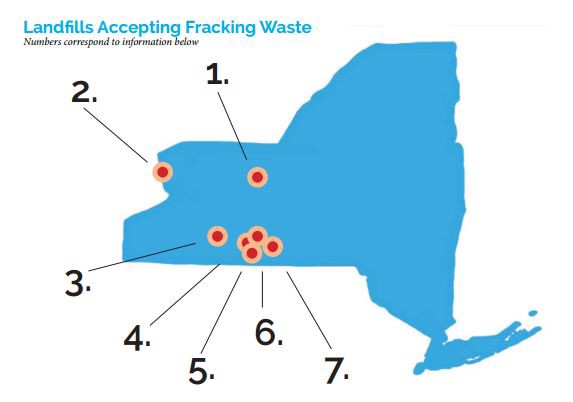New York’s ban on fracking hasn’t been enough to completely shield the state from its public health and environmental risks, a prominent state environment group charged on Friday.
In a report titled “License to Dump,” the group Environmental Advocates of New York (EANY) accused seven state landfills of accepting potentially hazardous waste from Pennsylvania’s fracked oil and gas wells. Using information obtained from the Pennsylvania Department of Environmental Protection, the group said at least 460,000 tons of solid drilling waste — which can contain heavy metals, chemicals, and naturally occurring radioactive material — have been dumped in those landfills since 2010.
“These are highly radioactive wastes. They are notoriously toxic,” report author Liz Moran told ThinkProgress. “And to just be accepting them in our landfills without knowing for sure that the public is going to be safe, it’s just irresponsible.”
The group’s report accuses the state Department of Environmental Conservation (DEC) of failing to adequately monitor the landfill sites for radioactivity, and criticizes the state for allowing fracking waste to be disposed in New York despite an ongoing moratorium and upcoming ban on the controversial well stimulation technique.
The DEC, however, is pushing back hard on the report’s claims. It admits that drilling waste from Pennsylvania’s fracked oil and gas wells is being dumped at seven landfills, but disputes that the waste is, or should be, designated as hazardous. The only wastes it accepts are drill cuttings and dewatered drilling mud, the agency said, products that it says do not contain fracking chemicals and only contain a small amount of radiation.
“The Environmental Advocates report is inaccurate, misleading and irresponsible,” DEC spokesperson Peter Constantakes said by e-mail. “New York has strong regulations on the types of materials that can be disposed of in landfills and DEC enforces these regulations to ensure all materials accepted at landfills are handled properly to protect the environment and public health.”

Much of the waste disposed at New York landfills is in fact drilling cuttings, which are bits of shale and dirt extracted from the ground before the fracking process begins. Because the cuttings contain pieces of the Marcellus Shale — which is naturally radioactive — Environmental Advocates’ report says that cuttings could expose the public to radon, radium-226, and radium-228, which are known human carcinogens.
The DEC said that the radioactivity of the cuttings is at the same levels commonly found in the environment and not harmful to human health. The agency has also stated that the only type of fracking waste New York landfills are permitted to accept is those drill cuttings, so claims that landfills are accepting fracking fluid — which can contain chemicals like benzene, formaldehyde, etholene glycol — are untrue.
The report pushes back on both of those claims. It noted that they examined the permits of all 7 landfills and found that only one — the Chemung County Landfill — has permit language specifically saying that only drill cuttings can be accepted from Marcellus Shale drilling waste. All the other landfills are subject to more broad New York regulations, which state that “drilling fluids, produced waters, and other wastes associated with the exploration, development, or production of crude oil, natural gas or geothermal energy” are allowed to be disposed.
The report also challenges the DEC’s claim that the radioactivity in the drill cuttings are not harmful to human health, asserting that radioactive material can collect in leachate pools at landfills — the contents of which eventually get treated at wastewater treatment facilities and released back into rivers and streams. Those rivers and streams often flow into drinking water systems, the report said, and New York’s wastewater treatment plants are not equipped to treat radioactive material.
“Ingestion of radium, which is soluble in water, can cause lymphoma, bone cancer, and leukemia,” the report reads. “Radium does not simply go away; radium-226 (a derivative ofuranium) remains in the environment for 1,600 years.”
The 460,000 tons of fracking waste disposed in New York landfills has been measured only back to 2010. Moran said there is no way to know how much has been disposed in those landfills before then, as the Pennsylvania DEP only began disclosing that information that year. New York’s DEC does not document how much or what kind of fracking waste from Pennsylvania is disposed of at its landfills.
Along with state documentation of the landfills accepting oil and gas waste, Environmental Advocates is asking the DEC to issue an emergency rulemaking to designate all oil and gas waste as a hazardous material, and begin monthly testing for radioactivity at landfills. In addition, the DEC is currently preparing to implement the state ban on fracking that Gov. Andrew Cuomo announced in December, and the group is asking for that ban to include provisions to prevent landfills from accepting other states’ drilling waste. The DEC did not respond to ThinkProgress’ inquiry on whether the ban would include such a provision.
New York lawmakers have attempted to keep fracking waste out of the state before. Last May, Senate Democrats introduced but ultimately failed to pass a four-bill package that would have, among other things, barred treatment facilities and landfills from accepting waste it. Massachusetts also tried to pass legislation to keep the waste out of the state last year.
